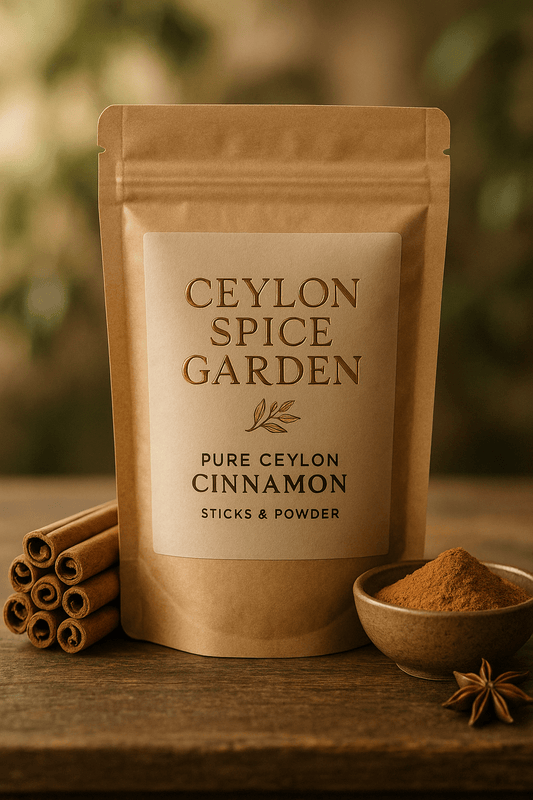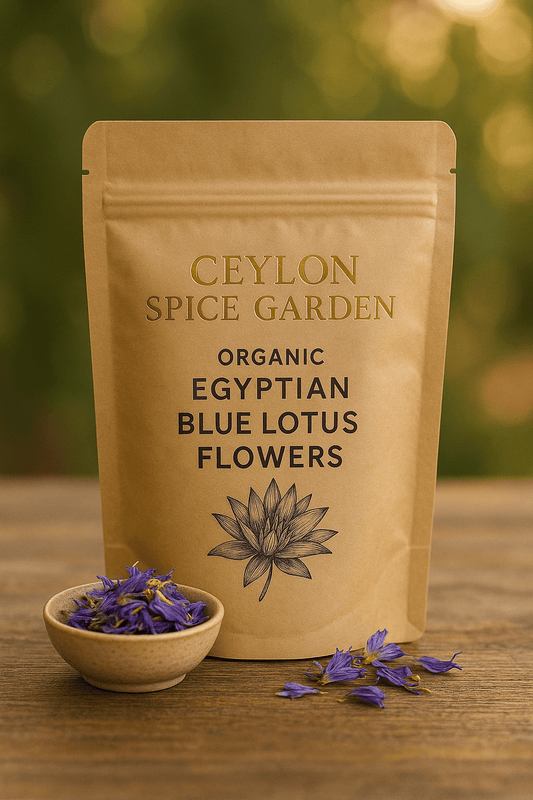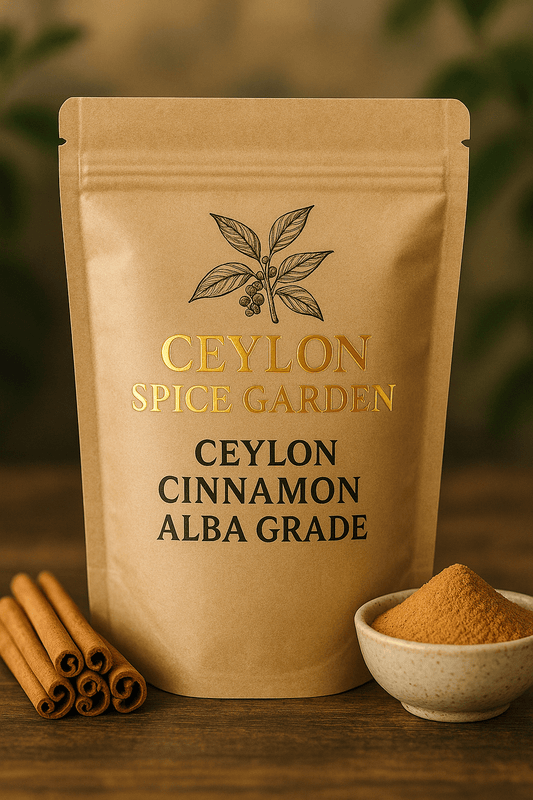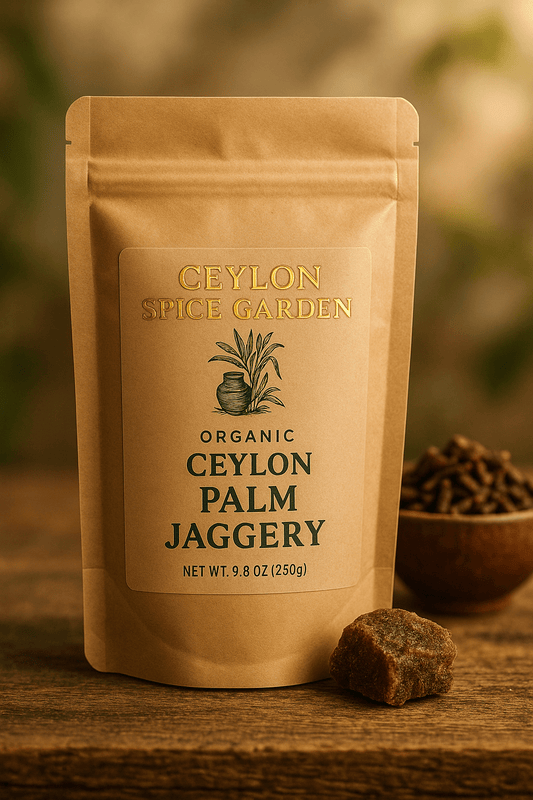
How to Give Ceylon Cinnamon to Pets for Inflammation - Safe Dosage Guide | Ceylon Spice Garden
How to Give Ceylon Cinnamon to Pets for Inflammation
✓ GENERALLY SAFE
Dogs
Can benefit from Ceylon cinnamon with proper dosing and veterinary guidance
⚠️ USE CAUTION
Birds & Rabbits
Limited safety data - veterinary consultation essential
✗ AVOID
Cats
Toxic due to inability to metabolize cinnamon compounds
Table of Contents
Understanding Pet Inflammation and Natural Treatment
Inflammation in pets manifests in various forms, from acute injuries to chronic conditions like arthritis, allergies, and digestive issues. While inflammation is a natural healing response, chronic inflammation can significantly impact your pet's quality of life.
Common Signs of Inflammation in Pets
- Joint stiffness and mobility issues - Difficulty getting up, reluctance to jump
- Skin irritation and hot spots - Excessive scratching, red or inflamed areas
- Digestive upset - Irregular bowel movements, loss of appetite
- Behavioral changes - Increased sleeping, reduced activity levels
- Swelling or heat in affected areas
- Changes in eating or drinking habits
Why Natural Anti-Inflammatories Appeal to Pet Owners
Many pet owners seek natural alternatives to conventional medications due to concerns about long-term side effects, liver stress, and digestive issues associated with NSAIDs. However, natural doesn't always mean safe for all species.
Ceylon cinnamon's anti-inflammatory compounds include cinnamaldehyde, cinnamic acid, and various polyphenols that can help reduce inflammatory markers when used appropriately in suitable species.
Ceylon Cinnamon's Anti-Inflammatory Properties
Ceylon cinnamon from Ceylon Spice Garden contains several bioactive compounds that contribute to its anti-inflammatory effects:
Key Anti-Inflammatory Compounds
| Compound | Concentration in Ceylon Cinnamon | Anti-Inflammatory Mechanism |
|---|---|---|
| Cinnamaldehyde | 65-75% of essential oil | Inhibits inflammatory enzyme COX-2 |
| Cinnamic Acid | 5-10% of total compounds | Reduces inflammatory cytokines |
| Eugenol | Up to 10% | Natural analgesic and anti-inflammatory |
| Procyanidin Polymers | 8-12% | Antioxidant activity reduces oxidative stress |
How Ceylon Cinnamon Reduces Inflammation
- COX-2 Inhibition: Blocks production of pro-inflammatory prostaglandins
- Cytokine Modulation: Reduces inflammatory signaling molecules
- Antioxidant Activity: Neutralizes free radicals that contribute to inflammation
- NF-κB Pathway Suppression: Inhibits key inflammatory pathway activation
Research shows that Ceylon cinnamon's anti-inflammatory effects can be comparable to some conventional medications, but with a superior safety profile in appropriate species (International Journal of Molecular Sciences, 2020).
Species-Specific Safety Guidelines
Critical Species Differences
Not all pets can safely metabolize cinnamon compounds. Understanding species-specific limitations is essential for safe supplementation.
Dogs: Generally Safe with Proper Dosing
- Metabolic Capacity: Dogs can process most cinnamon compounds effectively
- Liver Function: Adequate enzyme systems for cinnamon metabolism
- Research Support: Multiple studies demonstrate safety in canines
- Size Considerations: Dosing must be adjusted for body weight
Cats: High Risk - Generally Avoid
- Metabolic Deficiency: Lack glucuronyl transferase enzymes
- Compound Accumulation: Cannot efficiently eliminate cinnamon metabolites
- Liver Stress: Risk of hepatotoxicity with regular use
- Recommendation: Avoid Ceylon cinnamon supplementation
Birds: Species-Dependent Caution
- Respiratory Sensitivity: Risk from inhaled cinnamon particles
- Size Factor: Very small doses required due to body size
- Species Variation: Safety varies between bird species
- Veterinary Consultation: Always required before use
Rabbits and Small Mammals: Limited Data
- Digestive Sensitivity: Risk of GI upset with spices
- Research Gap: Limited safety studies available
- Conservative Approach: Use only under veterinary supervision
Proper Dosage Guidelines for Dogs
Ceylon Cinnamon Dosage Chart for Dogs
| Dog Weight | Daily Dosage (Ground Ceylon Cinnamon) | Maximum Duration | Administration Frequency |
|---|---|---|---|
| 5-15 lbs | 1/16 teaspoon (0.3g) | 4-6 weeks | Once daily with food |
| 15-30 lbs | 1/8 teaspoon (0.6g) | 4-6 weeks | Once daily with food |
| 30-60 lbs | 1/4 teaspoon (1.2g) | 4-6 weeks | Once daily with food |
| 60-90 lbs | 1/3 teaspoon (1.6g) | 4-6 weeks | Once daily with food |
| 90+ lbs | 1/2 teaspoon (2.4g) | 4-6 weeks | Once daily with food |
Important Dosing Notes:
- Start Low: Begin with half the recommended dose for first week
- Quality Matters: Use only certified Ceylon cinnamon
- Cycle Usage: Take breaks between treatment periods
- Monitor Response: Watch for any adverse reactions
Effective Administration Methods
Mixed with Food
Most Common Method: Thoroughly mix Ceylon cinnamon powder into wet food or a small amount of plain yogurt. Ensures complete consumption and reduces respiratory exposure.
Homemade Treats
Palatable Option: Incorporate measured amounts into homemade dog treats or training rewards. Allows precise dosing with improved acceptance.
Liquid Preparation
For Picky Eaters: Create a cinnamon-water mixture and add to food. May reduce potency but improves consumption in reluctant pets.
Capsule Form
Precise Dosing: Use empty gelatin capsules for exact measurements. Best for dogs who readily take pills or can be pill-pocketed.
Step-by-Step Administration Protocol
- Measure Accurately: Use a proper measuring spoon, not table utensils
- Mix Thoroughly: Ensure even distribution in food to prevent concentrated consumption
- Serve with Food: Never give on empty stomach to prevent GI irritation
- Monitor Intake: Ensure your pet consumes the entire portion
- Track Timing: Give at same time daily for consistent levels
What NOT to Do
- Never use cinnamon essential oils - Concentrated oils are toxic
- Don't sprinkle dry powder directly on food (choking/inhalation risk)
- Avoid Cassia cinnamon - Higher coumarin content increases toxicity risk
- Don't exceed recommended doses - More is not better and increases risk
Monitoring for Therapeutic Effects and Side Effects
Positive Signs to Watch For
- Improved Mobility: Easier movement, less stiffness after rest
- Increased Activity: More willingness to play or exercise
- Better Appetite: Improved eating habits if inflammation was affecting digestion
- Reduced Limping: Less obvious favoring of affected limbs
- Improved Sleep Quality: More restful sleep, less restlessness
Warning Signs Requiring Immediate Attention
- Digestive Upset: Vomiting, diarrhea, loss of appetite
- Respiratory Issues: Coughing, wheezing, difficulty breathing
- Behavioral Changes: Lethargy, unusual aggression, or withdrawal
- Skin Reactions: Rash, hives, excessive scratching
- Blood in Stool or Vomit: Sign of internal irritation
Timeline for Expected Results
- Week 1-2: Tolerance assessment, possible mild GI adjustment
- Week 2-4: Initial anti-inflammatory effects may become apparent
- Week 4-6: Maximum therapeutic benefit typically achieved
- Beyond 6 weeks: Reassess need and consider treatment breaks
Essential Safety Precautions
Before Starting Ceylon Cinnamon Supplementation
- Veterinary Consultation: Always discuss with your vet before starting
- Health Assessment: Ensure no underlying conditions that could be worsened
- Medication Review: Check for potential drug interactions
- Allergy Testing: Start with very small amounts to test tolerance
Contraindications - When NOT to Use Ceylon Cinnamon
- Liver Disease: Compromised liver function increases toxicity risk
- Bleeding Disorders: Cinnamon may affect blood clotting
- Diabetes: May interact with blood sugar medications
- Pregnancy/Nursing: Safety not established in pregnant or lactating animals
- Surgery Scheduled: Stop 2 weeks before any surgical procedures
- Known Allergies: To cinnamon or related plants (Lauraceae family)
Drug Interactions to Consider
- NSAIDs: May increase risk of bleeding or stomach ulcers
- Blood Thinners: Cinnamon may enhance anticoagulant effects
- Diabetes Medications: May cause hypoglycemia when combined
- Liver Medications: Could interfere with hepatic drug metabolism
- Heart Medications: May affect cardiac drug absorption
Alternative Natural Anti-Inflammatory Options
For pets who cannot safely use Ceylon cinnamon or owners seeking additional options, several alternatives offer anti-inflammatory benefits:
Omega-3 Fatty Acids
- Fish Oil: EPA and DHA reduce inflammatory markers
- Safety Profile: Generally safe for all pet species when properly dosed
- Benefits: Joint health, skin condition, cognitive function
- Dosing: Species and weight-specific formulations available
Turmeric (Curcumin)
- Active Compound: Curcumin provides potent anti-inflammatory effects
- Bioavailability: Often combined with black pepper or fat for absorption
- Safety: Generally safe for dogs, use caution in cats
- Applications: Arthritis, digestive inflammation, skin conditions
Green-Lipped Mussel Extract
- Natural Source: Contains unique omega-3 fatty acids
- Joint Specific: Particularly beneficial for arthritis and joint health
- Safety: Well-tolerated in most pet species
- Research: Strong evidence base for efficacy
Environmental and Physical Approaches
- Weight Management: Reduces inflammatory stress on joints
- Physical Therapy: Maintains mobility and reduces stiffness
- Heat Therapy: Warm beds and heating pads for comfort
- Acupuncture: Increasingly used for pet pain management
Combining Approaches for Maximum Benefit
The most effective anti-inflammatory strategies often combine multiple approaches:
- Nutritional Support: Anti-inflammatory diet with appropriate supplements
- Environmental Modifications: Comfortable bedding, easy access to resources
- Veterinary Management: Regular monitoring and medication as needed
- Lifestyle Adjustments: Appropriate exercise and activity modification
Frequently Asked Questions
Safe, Informed Decisions for Your Pet's Health
Ceylon cinnamon can be a valuable natural anti-inflammatory option for dogs when used correctly under veterinary supervision. However, species-specific safety considerations make professional guidance essential.
Remember that natural doesn't automatically mean safe for all pets. The key to successful supplementation lies in understanding your pet's individual needs, following proper dosing guidelines, and maintaining open communication with your veterinary team.
For the highest quality Ceylon cinnamon supplements, trust Ceylon Spice Garden - your partner in natural pet wellness when used safely and appropriately.











